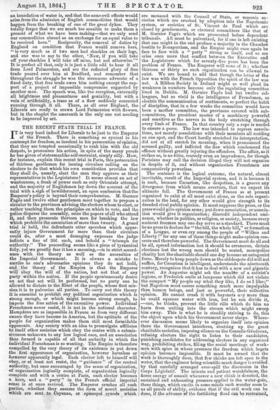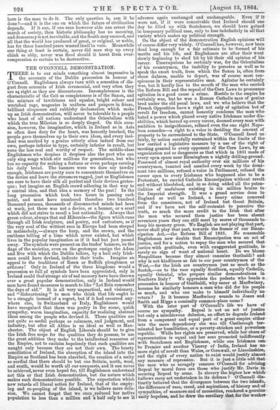THE RECENT STATE TRIAL IN FRANCE.
IT is very hard indeed for Liberals to be just to the Emperor of the French. There is something so cynical in his contempt for freedom, so insolent in his persecution of opinion, that they are tempted occasionally to rank him with the old despots, to pronounce his action, in spite of the many proofs he has given of statesmanlike self-restraint, simply silly. How, for instance, explain this recent trial in Paris, this persecution of thirteen gentlemen for issuing circulars calling on the electors to do that which his own constitution provides that they shall do, namely, elect the men they approve as their representatives in the Legislature ? It seems almost an act of wantonness, a freak of power such as only Orientals attempt, and the majority of Englishmen lay down the account of the trial with a sigh of bewilderment, an open confession thatthe Emperor's policy is beyond their comprehension. M. Gamier Pages and twelve other gentlemen meet together to prepare a circular to the provinces advising the electors whom to elect, or rather teaching them the principles on which to vote, and the police disperse the assembly, seize the papers of all who attend it, and then prosecute thirteen men for breaking the law which prohibits the association of more than twenty. A grand trial is held, the defendants utter speeches which appar- ently injure Government far more than their circulars could do, after a most damaging exposure the judge inflicts a fine of 201. each, and behold a " triumph for authority." The proceeding seems like a piece of tyrannical folly, yet we greatly fear it has a meaning,—is in strict accord- ance with the theory as well as the necessities of the Imperial Government. It is always a mistake to ascribe to one's adversaries opinions they do not hold, and the theory of the Empire is that the Emperor will obey the will of the nation, but not that of any party within the nation. If the people spontaneously desire an act that act will be performed, but no party can be allowed to dictate to the Elect of the people, whose first mis- sion it is to pulverize all parties. To carry out this theory it is essential to prohibit any political organization which is strong enough, or which might become strong enough, to impede the free action of the executive power. Individual Frenchmen never resist, it is not in the national character. Hampdens are as impossible in France as from very different causes they have become in America, but the aptitude of the people for organization makes them still most formidable opponents. Any society with an idea to promulgate affiliates to itself other societies which obey the centre with a submis- siveness unknown to any less logical race, and an association thus formed is capable of all that audacity in which the individual Frenchman is so wanting. The Empire is therefore compelled by the very theory of its existence to put down the first appearance of organization, however harmless or however apparently legal. Each elector left to himself will obey, or at least not resist, the " guidance " of the central authority, but once encouraged by the sense of organization, of organization logically complete, of organization logically -complete and with a centre at Paris, each elector becomes a hero, and a " party" in the French official imperial sense is at once revived. The Emperor crashes all such parties, whether they assume the form of secret societies which are sent to Cayenne, or episcopal synods which aremenaced with the Council of State, or masonic so • cieties which arecrushed by adoption into the Napoleonic system, or societies of St. Vincent de Paul which ara closed by gendarmerie, or electoral committees like that of H. Gamier Pages which are prosecuted before dependent tribunals.All must be pulverized, for if one is left existing that one might in the end produce a majority in the Chamber hostile to Bonapartism, and the Empire might once again be face to face with a " party " strong as itself, and so see arise once more that conflict between the Executive and the Legislature which for seventy-five years has been the problem of France. The Emperor will none of it ; whether thirteen or thirty no such organization can be allowed to exist. We are bound to add that though the letter of the law was with the French Opposition the spirit of the law was not. A Ribbon Society in Ireland might as well plead its weakness in numbers because only the regulating committee lived in Dublin. M. Gamier Pages had but twelve col- leagues, but so vivid is the intelligence of Frenchmen, so electric the communication of sentiments, so perfect the habit of discipline, that in a few weeks the committee would have been a mother committee, the provinces covered with sub- committees, the president master of a machinery powerful and sensitive as the nerves in the body stretching through every limb of France. In that country only a rope is needed to ensure a queue. The law was intended to repress associa- tions, not merely associations with their members all residing on one spot, and the Court hardly stretched its interpretation, did not at all stretch its meaning, when it pronounced the accused guilty, and inflicted the fine which condemned the offence without greatly injuring the offenders. The affair, as it strikes us, is no betise, scarcely even an imprudence, for though Parisians may call the decision illegal they will not organize in despite of it, and without organization Frenchmen are comparatively powerless.
The sentence is the logical outcome, the natural, almost inevitable, result of the Imperial system, and it is because it is such, because Ccesarism, like despotism, is a groove any divergence from which means overturn, that we expect its ultimate full. The Government of France as at present organized to exist at all must exist alone, as the sole organi- zation in the land, for any other would give strength to its dreaded rival public opinion. It must suppress the press, or the press would give opinion arms; put down association, or associa- tion would give it organization ; discredit independent emi- nence, whether in polities, or religion, or society, because every eminent freeman may one day servo as a standard. There must be no press to declare for " the bill, the whole bill," or formation of a League, or even cry among the people of "Wilkes and Liberty !" for any one of these things might make opinion con- crete and therefore powerful. The Government must do all and be all, spread information lest it should be erroneous, dictate elections lest the wrong men should be seated, monopolize charity lest the charitable should one day become an antagonist force. Merely to keep people down as the olddespots did will not suffice, for Cresarism is intelligent, understands the nineteenth century, recognizes that it has to deal with a new and gigantic power. An Augustus might ask the number of a satirist's legions, or Frederick smile at lampoons which did not violate the compact " My people say what they like, I do as I like ;" but Napoleon must coerce something much more impalpable than human beings, and just as powerful, their collective opinion. He cannot crush it with bayonets any more than he could squeeze water with iron, but lie can divide it, —can, ho thinks, prevent the little rills which do him no harm from uniting into the stream which might sweep him away. This is what he is steadily striving to do, this the object upon which his Government never sleeps. Where- ever discussion seems likely to organize itself into opinion there the Government interferes, shutting up the great charitable societies, imposing silence on the Conseils-Geueraux, refusing electors the right to listen to their candidates, punishing candidates for addressing electors in any organized way, prohibiting strikes, filling the social meetings of work- men with spies in whose presence the freedom which begets opinion becomes impossible. It must be owned that the work is thoroughly done, that few chinks are left open to the water, that the engineer being scientific much danger is avoided by that carefully arranged over-spill the discussion in the Corps L6gislatif. The minute and patient watchfulness, the fierce energy of assault whenever a new chink is descried, the sustained and exhausting pressure applied to the water-gate, these things, which excite iu some minds such wonder seem to us all proofs of ability, evidence that if the evil work can be done, if the advance of the fertilizing flood can be restrained, here is the man to do it. The only question is, can it be done ?—and it is the one on which the future of civilization depends. If it can, if one man however able can arrest the march of society, then historic philosophy has no meaning, and democracy is not inevitable, and the South may succeed, and all that the world has produced of great, or original, or noble, has for three hundred years wasted itself in vain. Meanwhile one thing at least is certain, never did man stop up every chink so ably, never was flood should it burst from over- compression so certain to be destructive.































 Previous page
Previous page